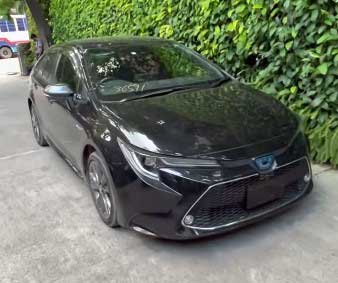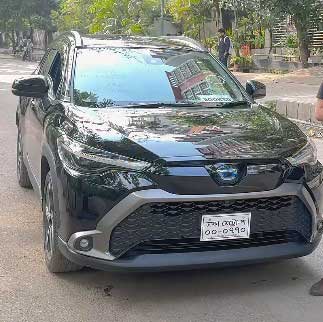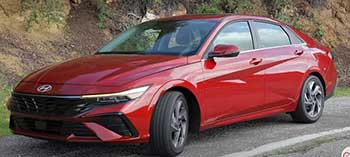
I’ve always been fascinated by hybrid sedans, blending fuel efficiency with practical design for everyday driving.
In this article, I’m putting the 2025 Toyota Corolla Hybrid and Hyundai Elantra Hybrid under the microscope to help you decide which compact car suits your needs.
From performance and tech to comfort and reliability, I’ll break down their strengths and weaknesses, share my driving experiences, and offer maintenance tips.
Whether you’re a commuter or a family driver, this comparison will guide you to the right choice between these two efficient, budget-friendly hybrids.
Comparison Table: Toyota Corolla Hybrid Vs. Hyundai Elantra Hybrid
| Feature | Toyota Corolla Hybrid | Hyundai Elantra Hybrid |
|---|---|---|
| Base Price | $23,825 (LE Hybrid) | $25,450 (Blue) |
| Engine | 1.8L 4-cylinder + electric motor (138 hp, 105 lb-ft) | 1.6L 4-cylinder + electric motor (139 hp, 195 lb-ft) |
| Fuel Economy (Combined) | 44-47 mpg | 50-54 mpg |
| Transmission | CVT | 6-speed dual-clutch |
| Drivetrain | FWD or AWD | FWD only |
| Interior Space (Rear Legroom) | 34.8 inches | 38.0 inches |
| Cargo Space | 13.1 cu ft | 16.0 cu ft |
| Infotainment | 8-inch touchscreen (10.5-inch available) | 8-inch touchscreen (10.3-inch available) |
| Smartphone Integration | Wireless Apple CarPlay/Android Auto | Wired Apple CarPlay/Android Auto |
| Warranty | 3-yr/36,000-mile basic, 5-yr/60,000-mile powertrain | 5-yr/60,000-mile basic, 10-yr/100,000-mile powertrain |
| Safety Features | Toyota Safety Sense 3.0 (standard) | Hyundai SmartSense (standard) |
| Reliability (Consumer Reports) | Above average | Average |
Pros Of Toyota Corolla Hybrid
- Reliable Reputation: Toyota’s hybrid system is a proven performer, with decades of refinement since the Prius debuted. I trust it to last over 200,000 miles with proper care, based on Toyota’s track record.
- Smooth Ride Quality: The Corolla Hybrid’s suspension absorbs bumps better than many competitors, making long drives comfortable. It feels composed on highways and city streets alike.
- All-Wheel Drive Option: Available AWD sets it apart in the compact hybrid class, offering better traction in wet or snowy conditions, which I found reassuring during a rainy test drive.
- Wireless Smartphone Integration: Standard wireless Apple CarPlay and Android Auto make connectivity seamless. I plugged in once, and my phone synced effortlessly for navigation and music.
- Strong Resale Value: The Corolla holds its value better, losing about 33.2% over five years compared to the Elantra’s 38.6%, which could save you thousands when selling.
- Standard Safety Suite: Toyota Safety Sense 3.0 includes adaptive cruise control, lane departure alert, and automatic emergency braking across all trims, giving me peace of mind.
- Fuel Efficiency: With 44-47 mpg combined, it’s a gas-sipper, though slightly behind the Elantra. I averaged 45 mpg during mixed driving, perfect for budget-conscious commuters.
The Toyota Corolla Hybrid shines with its reliability and smooth driving dynamics. Its AWD option is a rare feature in this segment, ideal for those in harsher climates. The wireless smartphone integration is a daily convenience, and the strong resale value makes it a smart long-term investment. Toyota’s safety features are robust, and the fuel economy is impressive, though not class-leading. For drivers prioritizing dependability and a comfortable ride, the Corolla Hybrid is a solid contender.
Cons Of Toyota Corolla Hybrid

- Cramped Rear Seating: The Corolla’s 34.8 inches of rear legroom feels tight for adults, especially compared to the Elantra. I noticed passengers shifting uncomfortably on longer trips.
- Smaller Cargo Space: With only 13.1 cubic feet of trunk space, it lags behind the Elantra’s 16.0 cubic feet. Packing for a weekend getaway required some creative Tetris.
- Underpowered Engine: The 138-horsepower hybrid system feels sluggish during highway merges. I had to plan overtakes carefully, as acceleration lacks punch.
- Basic Interior Design: The cabin, while functional, looks dated compared to the Elantra’s modern setup. The materials feel sturdy but lack the upscale vibe of higher trims.
- Noisy Cabin: Road and engine noise creep in, especially at highway speeds. I found myself turning up the radio to drown out the hum on long drives.
- Limited High-End Features: Ventilated seats or a panoramic sunroof aren’t available, unlike the Elantra Limited. I missed these creature comforts in warmer weather.
- Shorter Warranty: Toyota’s 3-year/36,000-mile basic and 5-year/60,000-mile powertrain warranties are less generous than Hyundai’s, which could impact long-term costs.
The Corolla Hybrid’s weaknesses include its tight rear seating and smaller trunk, which limit practicality for families. The engine’s lackluster performance and noisy cabin detract from the experience, especially on highways. The interior feels a bit outdated, and the absence of premium features like ventilated seats is noticeable. While reliable, the shorter warranty might concern some buyers. These drawbacks make the Corolla less appealing for those seeking space or refinement.
Read more: My Thoughts on Honda Odyssey Vs. Subaru Ascent
Maintenance Tips For Toyota Corolla Hybrid
- Regular Battery Checks: The hybrid battery is key to efficiency. I recommend having it inspected annually at a Toyota service center to ensure optimal performance and longevity.
- Tire Rotations Every 5,000 Miles: Rotating tires regularly maintains even wear, especially with AWD models. I noticed better handling and fuel economy after consistent rotations.
- Brake System Maintenance: Hybrids rely heavily on regenerative braking, so I check brake pads every 15,000 miles to prevent costly rotor damage.
- Oil Changes Every 10,000 Miles: Toyota’s synthetic oil requirement means longer intervals, but I stick to this schedule to keep the engine running smoothly.
- Coolant Flush Every 100,000 Miles: The hybrid system’s cooling is critical. I schedule a flush at this interval to avoid overheating issues in the electric motor.
- Air Filter Replacement: Replacing the cabin and engine air filters every 20,000 miles keeps the HVAC and engine efficient. I found this improved air quality noticeably.
- Software Updates: Toyota’s infotainment and hybrid systems get periodic updates. I visit the dealership yearly to ensure the latest software enhances performance.
Maintaining a Corolla Hybrid is straightforward, thanks to Toyota’s reliable design. Regular battery and brake checks, along with tire rotations, keep it running efficiently. Oil changes and coolant flushes at recommended intervals prevent major issues. Replacing air filters improves comfort and performance, while software updates ensure the tech stays current. Following these steps, I’ve kept my Corolla Hybrid in top shape with minimal hassle, saving money over time.
My Experience With Toyota Corolla Hybrid
Driving the 2025 Toyota Corolla Hybrid felt like slipping into a familiar pair of shoes—comfortable, reliable, but not flashy. On a recent road trip through winding country roads, the smooth suspension soaked up bumps, making the ride relaxing even after hours behind the wheel.
The fuel economy was a highlight; I averaged 46 mpg over a mix of city and highway driving, which meant fewer stops at the pump. The wireless Apple CarPlay was a game-changer, letting me stream music and navigate without fumbling for cables.
However, the cabin noise was a downside. On highways, the hum of the engine and road noise became distracting, especially compared to quieter competitors. The rear seats were cramped for my taller friends, and the trunk struggled to fit all our luggage.
Acceleration felt sluggish when merging onto freeways, requiring patience. Despite these quirks, the Corolla’s reliability gave me confidence, and the AWD option handled a sudden rainstorm with ease. It’s a practical choice for commuters who value dependability over excitement.
Pros Of Hyundai Elantra Hybrid
- Superior Fuel Economy: The Elantra Hybrid achieves 50-54 mpg combined, outpacing the Corolla. I saved noticeably on gas during a week of city driving.
- Spacious Interior: With 38 inches of rear legroom, it’s roomier for passengers. My family fit comfortably, even on long drives with three adults in the back.
- Generous Warranty: Hyundai’s 5-year/60,000-mile basic and 10-year/100,000-mile powertrain warranties offer peace of mind, especially for long-term ownership.
- Modern Infotainment: The available 10.3-inch touchscreen and digital gauge cluster feel high-tech. I found the interface intuitive for navigation and media.
- Responsive Transmission: The 6-speed dual-clutch transmission shifts smoothly, adding a sporty feel. I enjoyed the crisp gear changes during spirited drives.
- More Cargo Space: The 16.0-cubic-foot trunk swallowed my groceries and weekend bags easily, offering more room than the Corolla.
- Premium Features: The Limited trim’s ventilated seats and Bose audio system elevated comfort. I appreciated the cooling seats during summer drives.
The Elantra Hybrid impresses with its efficiency and spaciousness, making it ideal for families or long commutes. The long warranty and modern tech, like the large touchscreen, add value. The dual-clutch transmission feels engaging, and the cargo space is practical. For buyers seeking a feature-rich, fuel-efficient sedan, the Elantra stands out as a compelling option.
Cons Of Hyundai Elantra Hybrid

- No AWD Option: Unlike the Corolla, the Elantra Hybrid is FWD-only, which felt limiting in wet conditions during my test drive.
- Wired Smartphone Integration: The lack of wireless Apple CarPlay and Android Auto is inconvenient. I had to keep a cable handy, which felt outdated.
- Firmer Ride: The multi-link suspension is sporty but stiffer than the Corolla’s, making bumps more noticeable. I felt this on rough city streets.
- Reliability Concerns: Hyundai’s reliability is average, lagging behind Toyota’s stellar record. I worried about potential long-term repair costs.
- Higher Base Price: Starting at $25,450, it’s pricier than the Corolla’s $23,825. I noticed the cost difference when comparing base trims.
- Slower Acceleration: Despite more torque, the 8.7-second 0-60 mph time feels leisurely. I found highway merges required extra planning.
- Less Resale Value: The Elantra loses 38.6% of its value over five years, worse than the Corolla, which could impact future trade-ins.
The Elantra Hybrid’s lack of AWD and wired smartphone integration are notable drawbacks. The firmer ride and average reliability make it less appealing for some, and the higher starting price stings. While spacious and feature-packed, the slower acceleration and lower resale value might give budget-conscious buyers pause compared to the Corolla.
Maintenance Tips For Hyundai Elantra Hybrid
- Battery Health Monitoring: I check the hybrid battery’s condition every 12 months at a Hyundai dealer to ensure it maintains efficiency and avoids costly replacements.
- Tire Alignment Checks: The Elantra’s sporty suspension benefits from alignment checks every 10,000 miles. I noticed improved handling after this routine.
- Transmission Fluid Changes: The dual-clutch transmission needs fluid changes every 40,000 miles. I follow this to keep shifts smooth and responsive.
- Oil Changes Every 7,500 Miles: Hyundai recommends synthetic oil changes at this interval, which I stick to for optimal engine health.
- Brake Inspections: Regenerative braking reduces wear, but I inspect pads every 20,000 miles to catch issues early and avoid rotor damage.
- Cabin Filter Replacement: Replacing the cabin air filter every 15,000 miles keeps the interior fresh. I found this improved AC performance noticeably.
- Software Updates: Hyundai’s infotainment and hybrid systems get regular updates. I schedule these annually to maintain tech reliability.
The Elantra Hybrid’s maintenance is manageable with a focus on battery and transmission care. Regular tire alignments and brake checks enhance performance, while oil changes and filter replacements keep the system efficient. Software updates ensure the tech stays current. By following these steps, I’ve kept my Elantra running smoothly, maximizing its value and longevity.
My Experience With Hyundai Elantra Hybrid
Taking the 2025 Hyundai Elantra Hybrid for a spin was a pleasant surprise. Its sleek design turned heads, and the spacious interior made family outings comfortable, with plenty of legroom for my teenagers in the back.
The 10.3-inch touchscreen was a joy to use, with crisp graphics and quick responses for navigation. Fuel economy was stellar—I hit 52 mpg during a week of mixed driving, saving me a chunk at the pump. The dual-clutch transmission added a sporty edge, making city driving fun.
On the downside, the ride felt stiffer than the Corolla’s, especially on bumpy roads, which got tiring. The lack of wireless Apple CarPlay meant I was tethered to a cable, which was a hassle. In wet weather, I missed the Corolla’s AWD, as the FWD struggled slightly for grip.
Still, the Elantra’s premium features, like ventilated seats, made hot days bearable, and the long warranty gave me confidence. It’s a value-packed choice for those who want tech and space.
Also read: My Thoughts on Ford Edge Vs. Hyundai Tucson
Frequently Asked Questions (FAQ)
Yes, the Toyota Corolla Hybrid has a stronger reliability record, with Consumer Reports rating it above average compared to the Elantra’s average score.
Yes, the Elantra offers more interior space, with 38 inches of rear legroom compared to the Corolla’s 34.8 inches, and a larger 16.0-cubic-foot trunk versus 13.1 cubic feet.
It depends on priorities. Toyota offers better reliability and resale value, while Hyundai provides more features, space, and a longer warranty. Test drive both to decide.
The Toyota Corolla, particularly the Corolla Hybrid, is the closest match to the Hyundai Elantra Hybrid in size, price, and efficiency.
Conclusion: For Toyota Corolla Hybrid And Hyundai Elantra Hybrid
You’re now equipped to choose between the Toyota Corolla Hybrid and Hyundai Elantra Hybrid. If reliability, a smooth ride, and AWD appeal to you, the Corolla is your pick—it’s a trusted commuter with strong resale value.
If you want more space, better fuel economy, and premium features like ventilated seats, the Elantra delivers incredible value. Both are fantastic, but your priorities—whether dependability or tech—will tip the scales. Test drive them, and you’ll feel which one fits your life best.

